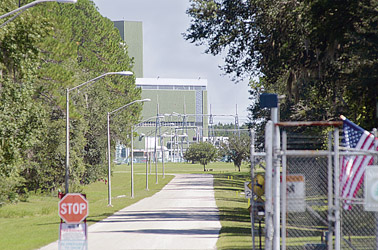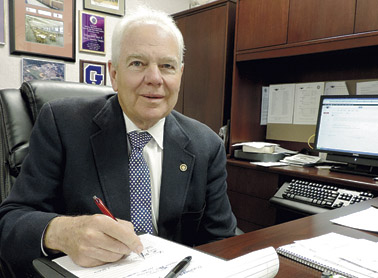
ALACHUA - Robert Wilford, Alachua city commissioner, was watching television at his home in Turkey Creek when his wife told him to come outside and listen.
“It sounded like a jet engine,” he said.
They heard the newly operational Gainesville Renewable Energy Center (GREC) generating electricity. Since late August, when the GREC biomass plant started running, some residents of Turkey Creek in Alachua have been vocal about the noise and dust pollution coming from the energy center.
On the Sept. 23 city commission meeting in Alachua, about three dozen residents came to the commissioners with their grievances.
“It’s definitely something that’s affecting a lot of people,” said Adam Boukari, assistant city manager. “It’s a really serious issue.”
In 2010, residents of Turkey Creek were assured they wouldn’t even know the biomass plant was there, Wilford said. State-of-the-art technology was supposed to minimize noise and pollution, but that didn’t happen, he said.
“When they cranked it up in August and the noise came up, it was a total shock to everybody,” he said.
One neighbor reported the plant was running at 3:30 a.m. on Monday morning.
Alachua County is focusing its efforts on putting people in touch with the right agency, said Chris Bird, director of the Environmental Protection Department. Since the biomass plant is in Gainesville, the Gainesville Police Department (GPD) is in charge of enforcing the city’s noise ordinances. The Alachua County Environmental Protection Department is responsible for looking into the issue of dust pollution coming from the wood piles at the plant.
The complaints at the Sept. 23 city commission meeting were evenly split between the issues of noise and dust pollution, Boukari said.
The commission voted to send letters out to several officials, including county commissioners, city commissioners, the county manager, state legislators and U.S. senators.
The city is encouraging Alachua residents to reach out and voice their concerns, he said, and will listen for feedback.
“We’re keeping our ears close to the ground,” Boukari said.
The county’s environmental protection agency will conduct tests to measure the amount of wood dust in the air, Bird said. It has already established wood piles at the plant as the source of the pollution, but the extent is still unclear.
Some employees of the nearby compound for the Alachua County public works department have complained about health problems.
“We’ve had reports of irritated eyes, nose and throats, congestion and breathing issues,” he said.
The Florida Department of Environmental Protection (DEP) doesn’t allow fugitive dust particles. If the plant is found in violation of DEP guidelines, it could be ordered to fix the problem or face a fine if it doesn’t comply. It could also face losing some of its permits.
“Hopefully, what people are complaining about is going to get fixed,” Bird said.
The last few months have been rainy, but he wondered what would happen under dryer conditions, where the dust would be more susceptible to getting blown into the air.
“What happens when we get into a drought?” he asked. “GREC needs to figure out how to manage this dust so it doesn’t become a problem during a drought.”
Commissioner Wilford was diagnosed with chronic bronchitis two years ago, and worries about the effect the pollution might have on his health.
“If it’s not cleared up, certainly I will be concerned,” he said.
He wrote an email to several local officials expressing his dissatisfaction with the biomass plant.
“I realize that you are being bombarded with a plethora of complaints regarding GREC's operations. Being brutally candid, based on the manner in which GREC is failing to address the many valid concerns being expressed by residents of the Turkey Creek, Brooke Pointe and Staghorn subdivisions, residents of the Town of Hague, residents of the manufactured home subdivision located across from the Turkey Creek subdivision, and also some residents of non-incorporated Alachua County who live close to the center, you and the management of GREC have ignominiously earned the wrath of the many individuals and families who are being continually and adversely impacted by your center's questionable operations and the obvious lack of regard for our individual rights,” he wrote.
County commissioners have received several similar emails from other residents.
“If this noise continues, I will be forced to go to a fine rated motel and I will send you'll the invoice,” wrote Paul Yatsko, from Alachua. “You need to close this operation down until all the noise and dirt problems are solved.”
County Commissioner Susan Baird said that like Wilford, she was told the plant wouldn’t be a problem.
“As a county commissioner, I think it’s our responsibility to examine these noise levels right away,” she said. “When 30 people show up at a city meeting, there’s a problem.”
Rick Wolf, assistant director of the county’s Department of Growth Management, wrote to Baird saying the maximum noise level for a commercial property is 60 decibels during the day and 66 during the night. Any facility in violation will be considered a noise disturbance, he said.
Because the source of the noise is in Gainesville and most of the complaints are coming from the city of Alachua, the county probably doesn’t have the jurisdiction to do anything, Wolf said. A meeting is planned for Oct. 8, where the county will hopefully decide on a policy, he said.
GREC has hired consultants to perform their own tests.
Alachua City Commissioner Ben Boukari spoke with GREC representatives on Sept. 30, according to an email he wrote to the county commission.
“What I have learned is that GREC doesn’t deny there is a noise issue,” he wrote. “They are waiting for information to come back to them that will allow them to identify what specifically is causing the noise.”
GREC experts expect to have the information in two weeks, he wrote.
Local law enforcement has already performed some preliminary tests which showed the noise level, while loud, was below the legal limit, said Ben Tobias, spokesman for the GPD. However, the tests were only taken over a period of one night, and are not necessarily indicative of the average volume level of the plant. For a more accurate understanding, tests will have to be conducted over a longer period of time.
“The issue is obviously not resolved,” Tobias said. “We’re not just going to stop with one set of measurements.”
While the state DEP, Alachua County Environmental Protection Department and other local agencies look into some of the complaints, the City of Alachua is weighing its options and waiting to see test results, said Adam Boukari, assistant city manager.
The issues coming from the biomass plant undermine the reason people moved to neighborhoods like Turkey Creek, Commissioner Wilford said.
“We can’t enjoy the peace and tranquility that we used to have,” he said.
# # #
Email cmckinney@
alachuatoday.com



